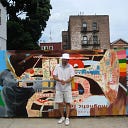AN ARRESTING GAZE
Controlling Bodies in Public Space

Begn 1976, New York Penal Law Section 240.37 criminalized loitering in a public place by anyone whom the police determined present for the purpose of prostitution.
“Purpose” is not defined in New York’s Penal Law, thus the reason for one’s presence was ultimately decided by the opinions of arresting officers. On any street, sidewalk, bridge, plaza, park, subway, or inside her motor vehicle, a woman could be arrested for repeatedly beckoning or attempting to engage passers-by in conversation. A woman could be surveilled, searched, and detained, in part because an officer took issue with her clothing.

When processing Section 240.37 arrests, officers and prosecutors relied on pre-printed affidavits to select “indications of prostitution” including: the defendant was standing somewhere other than a bus stop or taxi stand; the defendant was carrying money or “sexual paraphernalia”; the defendant was with someone known to have been previously arrested for prostitution-related offenses. None of the choices, in and of themselves, reflect any illegal activity.

The New York City Police Department (NYPD) Patrol Guide also instructed officers to inform prosecutors of an arrestee’s clothing, as “pertinent information” to a probable cause inquiry. But the NYPD offered no objective criteria on what attire would be considered suspect, thus failing citizens the ability to anticipate how their fashion could establish cause for their arrest. Fashion, of course, is also constitutionally protected behavior.

Police officers made their decisions to arrest often through a strange sexualized gaze.

From 2012 through 2015, nearly 1,300 individuals were arrested in New York City under the law, and data show 85% of them were Black or Latina.
Transgender women were especially victimized, and were arrested in “sweeps” of places where they gathered as a community.

On September 30, 2016, The Legal Aid Society of New York and Cleary Gottlieb Steen & Hamilton LLP filed a civil rights class action, D.H. v. City of New York, against the New York City Police Department on behalf of women who had been wrongly arrested for inherently innocent conduct under New York Penal Law Section 240.37. In October, I was introduced to Legal Aid attorneys through my work as a resident artist in a transgender housing unit at the Manhattan Detention Complex in New York City. The illustrations from this article are based on redacted NYPD arrest affidavits used as “indications of prostitution” that were shared with me from the lawsuit.

In January 2018, the Southern District of New York court dismissed a majority of the D.H. v. City of New York plaintiffs’ claims. That June, the case entered mediation and the NYPD agreed to modest reforms and to ammend its patrol guide. Nevertheless, in the following months, “loitering for the purpose of prostitution” arrests began to rise. Although such arrests had declined in New York State from 2010 to 2016, the number of arrests in New York City nearly tripled from 2017 to 2018, the majority of which occurred after the NYPD amended its patrol guide.

In 2018, legislators introduced a bill to completely repeal New York Penal Law Section 240.37, “which has led to arbitrary and discriminatory enforcement by targeting women from marginalized groups that are at high risk for sex trafficking and other exploitation and abuse.” The bill did not reach a floor vote that year, but the movement to repeal grew, and Section 240.37 became known as the “Walking While Trans Ban.”
In February 2021, after years of legal battle and incredible advocacy from grassroots organizations and community activists, legislation was signed to repeal the law prohibiting “loitering for the purpose of engaging in a prostitution offense.”
NYPD continues to arrest women for engaging in sex work.
This article originally appeared on VanityFair.com as An Arresting Gaze: How One New York Law Turns Women into Suspects. It has been updated to reflect the repeal of New York Penal Law Section 240.37.
